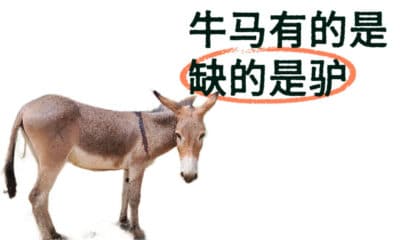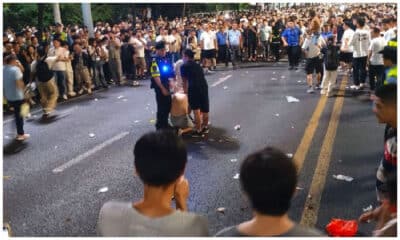China Media
Zhang versus Zhang: An Online Debate over the Value of Studying Journalism in China
Is pursuing a degree in journalism worth it in China? Educational adviser Zhang Xuefeng says no, while professor Zhang Xiaoqiang says yes. Their online debate has captivated millions of people.
Published
2 years agoon
By
Zilan Qian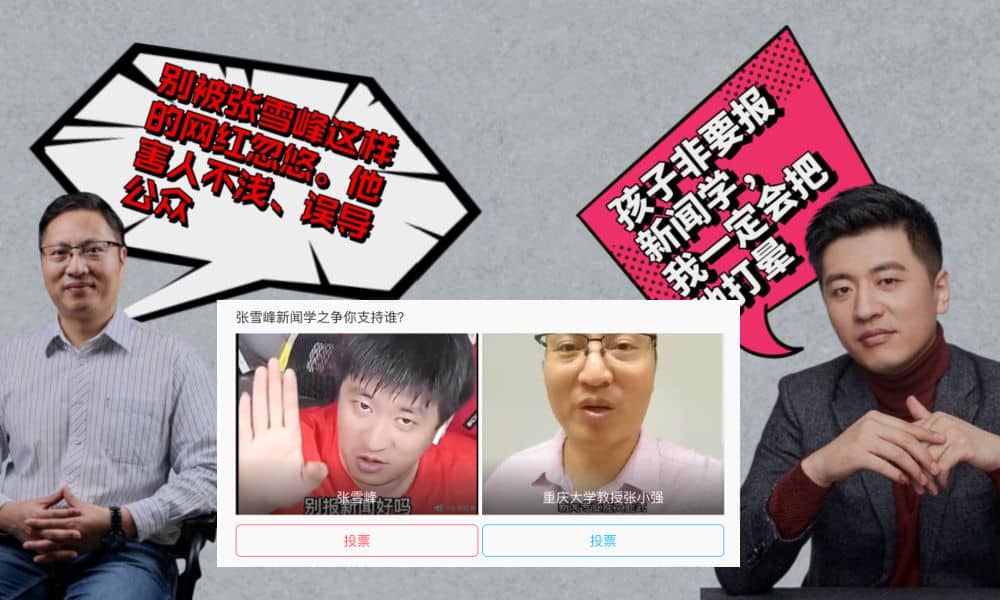
Chinese educational internet influencer Zhang Xuefeng (张雪峰) recently sparked a trending discussion by strongly discouraging Chinese youth from pursuing a degree in journalism. While scholars and state media emphasize the merits of studying journalism, a significant number of netizens question its benefits, labeling it as impractical, uneducational, and restrictive.
With the announcement of the 2023 Chinese National College Entrance Examination (Gaokao) scores this week, the process of selecting university preferences has become the focal point for more than 12.9 million families in China.
Zhang Xuefeng (张雪峰), an internet celebrity widely recognized as the “famous teacher for postgraduate entrance exams,” has found himself at the center of an online controversy for advising students against applying for journalism programs.
According to a report by Lianhe Zaobao (联合早报), the incident originated from a livestreamed phone conversation between Zhang Xuefeng and a parent of a student, who was seeking advice.
Upon learning that a science student from Xinjiang had estimated a score of 590 – surpassing the cutoff for admission to first-tier universities, – while expressing an interest in applying for the journalism program at Sichuan University, Zhang Xuefeng reacted with some extreme emotions and remarks.
He advised against pursuing journalism, stating, “Don’t apply for journalism! Any other major you choose blindly would be better than journalism.” He even went as far as saying that if he were the parent, he would “definitely knock the child unconscious if they insisted on studying journalism” (“这孩子非要报新闻学,我一定会把他打晕”).
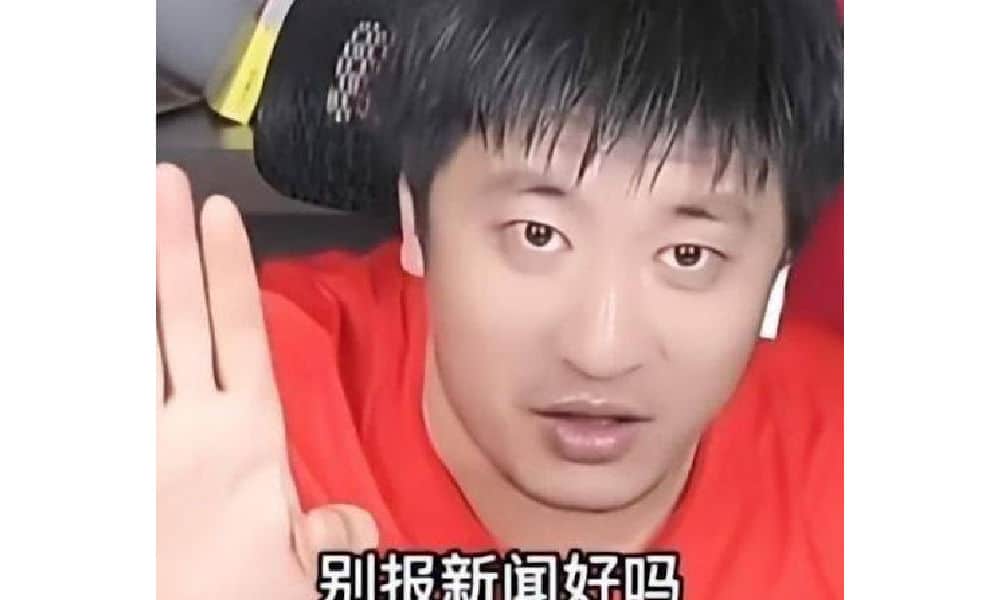
A screenshot of Zhang Xuefeng’s live stream phone call session in which he dissuaded the student from selecting Journalism. The line reads: “Just don’t select Journalism, ok?”
After a video of their livestreamed conversation was shared by Yan Tu Education, Zhang Xuefeng’s educational company, on their official Douyin account, Zhang’s provocative remarks gained attention from various parties, including journalism scholars and Chinese (state) media outlets.
The ‘Zhang vs Zhang’ online debate started in mid-June when Professor Dr. Zhang Xiaoqiang (张小强) from Chongqing University’s School of Journalism criticized Zhang Xuefeng’s comments, describing them as “harmful and misleading to the public” (“害人不浅,误导公众”).
According to media outlet The Paper, Dr. Zhang argues that the field of journalism is applicable to many different domains, and parents can trust the journalism departments in prominent Chinese universities and colleges.
He believes that the negative perception of the journalism profession stems from the narrow belief that it only leads to careers in traditional media. However, Dr. Zhang asserts that graduates from journalism departments go on to work in various fields.
He suggested that journalism graduates are often recruited for communication roles, and that they can find employment at government organizations, state-owned enterprises, new media companies, or even gaming start-ups. He also cautioned against being deceived by individuals like Zhang Xuefeng, whom he referred to as a mere “internet celebrity.”
Three Reasons Not To Pursue Journalism Major in China
While there are authoritative voices defending journalism education, there is still substantial support for Zhang Xuefeng’s perspective on discouraging journalism as a career choice.
This support mainly stems from three primary reasons: the perceived impracticality of the profession, doubts about the substantive nature and effectiveness of journalism education, and concerns about the limited freedom and liberal values within the field.
1. Not Practical (“无用”)
Firstly, a journalism degree has been deemed as “impractical” as it cannot guarantee good employment prospects.
Zhang Xuefeng dissuades students from pursuing journalism because, according to him, choosing this major would make it hard to secure a livelihood. For families with limited resources, it is important to choose a field of study that is practical and will enable young people to support themselves (“吃上饭”).
He also emphasizes the need to consider real-life circumstances rather than blindly following prescribed norms. Zhang said, “I am not targeting anyone or any specific profession. I am only providing suggestions based on employment situations. If your child cannot find a job, the responsibility lies not with the teachers but with you as parents!”
However, individuals like Dr. Zhang Xiaoqiang strongly oppose such practicalism. On June 17th, during an interview with Fengmian News (封面新闻), Professor Zhang Xiaoqiang stated that the primary consideration for choosing a major should be the student’s interest instead of employability.
Similarly, China Education Daily (中国教育报) published an article titled “Beware of the Misleading Influence of Internet Celebrity Remarks on College Major Selection” (“警惕网红言论误导志愿填报”), condemning Zhang Xuefeng’s statement for being overly arbitrary and shortsighted. The article emphasizes that personal interests and aspirations are also crucial in major selection and encourages young people to dream big and explore uncertainties.
However, many netizens support Zhang’s pragmatic approach and criticize scholars and state media for being overly idealistic and lacking understanding of the difficulties faced by ordinary people, and especially the younger generations, in China today.
The phrase “Why not eat meat?” (“何不食肉糜,” referring to those in positions of power and influence often failing to understand the hardships of common people) has become widely used in this discussion to highlight the discrepancy between scholars and authoritative voices who advocate for choosing majors based on interests and the economic constraints faced by many families.
“The lower the socioeconomic status of the family, the higher the cost of making mistakes in choosing a major, and therefore students should be more cautious in their decision-making,” commented one netizen, contradicting the argument that young people should pursue their passions without considering practicality.
2. Non-Educational (“无学”)
Studying journalism in universities has also faced criticism for being seen as “non-educational” due to the belief that a journalism degree is unnecessary to become a journalist and lacks a substantial theoretical foundation.
The non-profit organization ‘Narada Insights’ (@南都观察) posted an opinion piece by Liu Yuanju (刘远举), a research fellow at the Shanghai Institute of Finance and Law, on their Weibo account. In the piece, Liu highlights the failure of journalism education to provide in-depth content. Writing skills in journalism can be acquired by competent high school graduates, and the ability to gather and evaluate information is a fundamental skill that extends beyond the journalism field, primarily developed through life and work experiences. Therefore, Liu argues, it becomes challenging for students to acquire specific journalism-related skills and knowledge in universities.
Furthermore, Liu points out that journalism is often perceived to have a relatively low entry barrier, as many successful media professionals do not hold journalism degrees at all. On the other hand, knowledge in areas such as science, technology, economics, finance, or law can be advantageous for journalism work. In practice, media organizations often prefer candidates with these kind of educational backgrounds, as they are the ones with specialized expertise in specific industries.
3. Lack of Freedom (“无自由”)
One third complain and common perception of journalism departments is that they primarily teach students how to align with the state’s agenda, which has led to accusations of Chinese journalism being severely restrictive.
Author Liu Shen Leilei (六神磊磊), a former journalist of Politics and Law at the Chongqing Branch of Xinhua News Agency, shared his thoughts on this topic on Weibo. According to Liu, journalism departments lack substantial theories and instead instruct students to be obedient and comply with authorities.
One journalism graduate agreed with Liu’s post, suggesting that they were being compelled to say what the state wants: “I graduated in journalism, and I have a deep aversion to the field. We not only lack the freedom to speak the truth but are also deprived of the freedom to remain silent.”
Even if students possess enough passion to overcome the ‘impractical’ and ‘uneducational’ aspects of journalism education in Chinese universities, they may be disillusioned when they find that the practice of “journalism” in China does not align with their expectations and ideals.
In response to Liu Shen Leilei’s post, another commenter emphasized the profound challenge of reporting the truth in today’s context and asserted that “journalism has died (新闻已死).” This statement reflects the perception that authentic and truthful reporting has become virtually non-existent. Instead, media outlets are believed to employ various tactics to attract attention and disseminate state propaganda. On social media, there is a frequent suggestion to “rename journalism departments as propaganda departments” to reflect this perceived reality.
An End to the Debate?
As the Zhang versus Zhang discussion on pursuing a degree in Journalism continued, Dr. Zhang Xiaoqiang recently took to his social media to express his desire to end the debate, acknowledging the overwhelming criticisms from netizens (#张小强称给自己和张雪峰争论画上句号#, #张小强说和张雪峰争论结束#).
“I still firmly believe that journalism and communication are good majors with promising prospects,” he wrote. “However, media professionals and educators need to foster a positive public opinion and social environment for their own development. We must first prove ourselves.”
Meanwhile, on Chinese social media, various hashtags have emerged in light of this discussion. One of them is “Who Do You Support in the Zhang Xuefeng Journalism Studies Debate?” (#张雪峰新闻学之争你支持谁#), which has reached over 130 million views on Weibo by now.
There even is a possibility to vote on whose side you are.

With more than 42,000 votes, it is clear who the majority of netizens agree with most: 39,000 voters agreed with Zhang Xuefeng that studying journalism is not a favorable option for Chinese young people today.
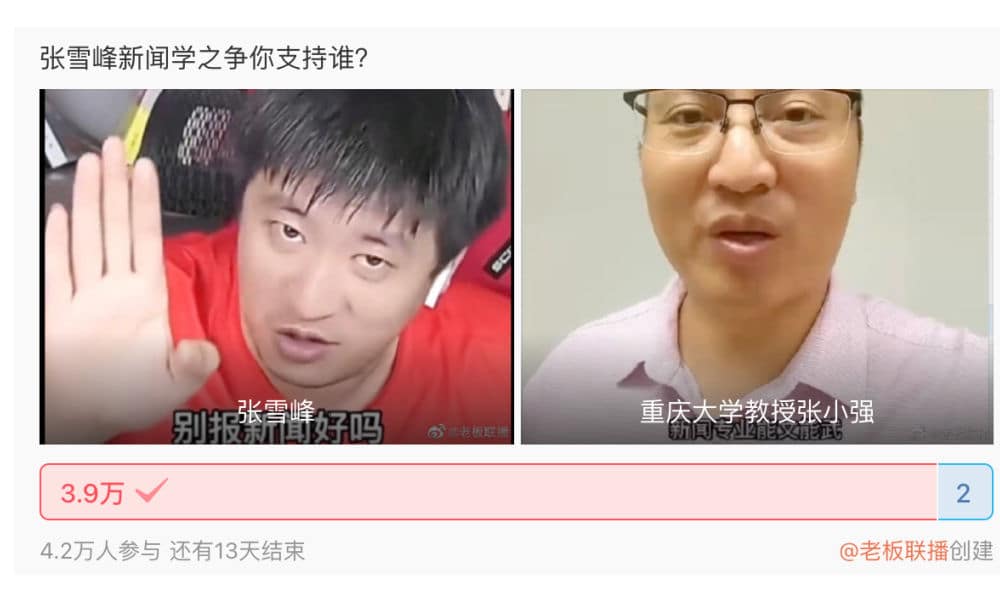
“They’re starting rumors, smooth things over, and oppose the people,” another person criticizes the state of journalism.
While the debate between Zhang Xuefeng and Professor Zhang Xiaoqiang may have temporarily subsided, the ongoing discourse surrounding the significance of journalism in China is bound to continue.
By Zilan Qian
Get the story behind the hashtag. Subscribe to What’s on Weibo here to receive our newsletter and get access to our latest articles:
Part of featured image via Xigua Shipin.
Spotted a mistake or want to add something? Please let us know in comments below or email us. First-time commenters, please be patient – we will have to manually approve your comment before it appears.
©2023 Whatsonweibo. All rights reserved. Do not reproduce our content without permission – you can contact us at info@whatsonweibo.com.
Zilan Qian is a China-born undergraduate student at Barnard College majoring in Anthropology. She is interested in exploring different cultural phenomena, loves people-watching, and likes loitering in supermarkets and museums.

You may like
China Media
China’s “AFP Filter” Meme: How Netizens Turned a Western Media Lens into Online Patriotism
Chinese netizens embraced a supposed “demonizing” Western gaze in AFP photos and made it their own.
Published
1 month agoon
September 10, 2025By
Ruixin Zhang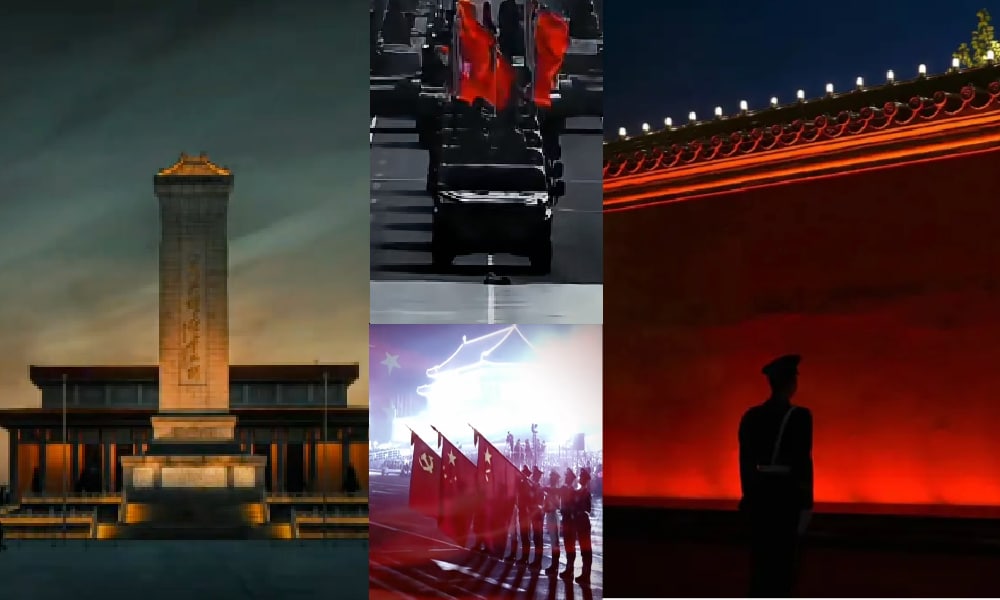
For a long time, Chinese netizens have criticized how photography of Chinese news events by Western outlets—from BBC and CNN to AFP—makes China look more gloomy or intimidating. During this year’s military parade, the so-called “AFP filter” once again became a hot topic—and perhaps not in the way you’d expect.
In the past week following the military parade, Chinese social media remained filled with discussions about the much-anticipated September 3 V-Day parade, a spectacle that had been hyped for weeks and watched by millions across the country.
That morning, Chinese leader Xi Jinping, accompanied by his wife Peng Liyuan, welcomed international guests on the red carpet. When Xi arrived at Tiananmen Square alongside Russian President Vladimir Putin and North Korean leader Kim Jong-un, office phone calls across the country quieted, and school classes paused to tune in to one of China’s largest-ever military parades along Chang’an Avenue in Beijing, held to commemorate China’s victory over Japan in the Second Sino-Japanese War and World War II.
As tanks rolled and jets thundered overhead, and state media outlets such as People’s Daily and Xinhua livestreamed the entire event, many different details—from what happened on Tiananmen Square to who attended, and what happened before and after, both online and offline—captured the attention of netizens.
Amid all the discussions online, one particularly hot conversation was about the visual coverage of the event, and focused on AFP (法新社), Agence France Press, the global news agency headquartered in Paris.
Typing “AFP” (法新社) into Weibo in the days after the parade pulled up a long list of hashtags:
- Has AFP released their shots yet?
- V-Day Parade through AFP’s lens
- AFP’s god-tier photo
- Did AFP show up for the parade?
The fixation may seem odd—why would Chinese netizens care so much about a French news agency?

Popular queries centered on AFP.
The story actually goes back to 2022.
In July of that year, on the anniversary of the Communist Party’s founding, one Weibo influencer (@Jokielicious) noted that while domestic photographers portrayed the celebrations as bright and triumphant, she personally preferred the darker, almost menacing image of Beijing captured by Western journalists. In her view, through their lens, China appeared more powerful—even a little terrifying.
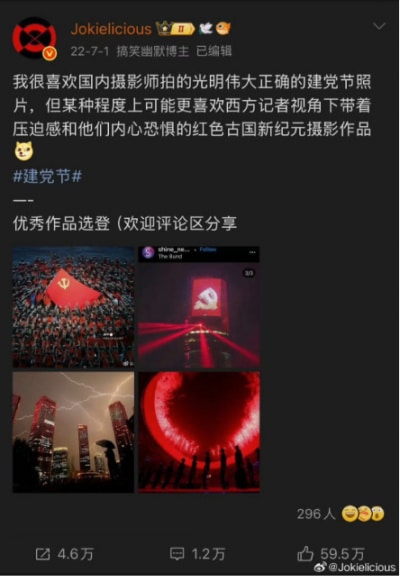
The original post.
The post went viral. Soon, netizens began comparing more of China’s state media photos with those from Western outlets. One photo in particular stood out: Xinhua’s casual, cheerful shot of Chinese soldiers contrasted sharply with AFP’s cold, almost cinematic frame.
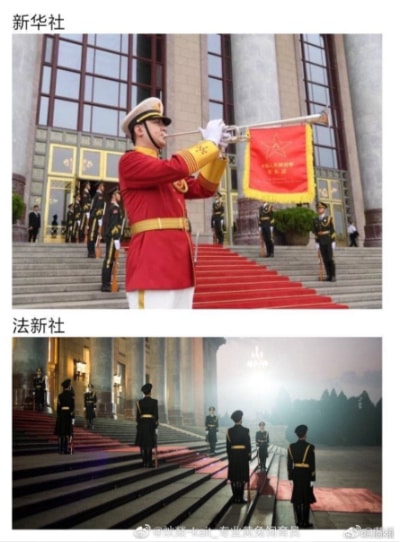
Same event, different vibe. Chinese social media users compared these photos of Xinhua (top) versus AFP (down). AFP photo shot by Fred Dufour.
Netizens joked that Xinhua had made the celebration look like the opening of a new hotel, while AFP had cast it as “the dawn of an empire.”
Gradually, what began as a dig at the bad aesthetics of state media turned into something else: a subtle shift in how Chinese netizens were rethinking their country’s international image.
Under the hashtag #ChinaThroughOthersLens (#老中他拍), netizens shared images of China as seen through the lenses of various Western media outlets.
This wasn’t the first time such talk had appeared. In the early days of the Chinese internet, people often spoke of the so-called “BBC filter.” The idea was that the BBC habitually put footage of China under a grayish filter, making its visuals give off a vibe of repression and doom, which many felt was at odds with the actual vibrancy on the ground. To them, it was proof that the West was bent on painting China as backward and gloomy.
These discussions have continued in recent years.
For example, on Weibo there were debates about a photo of the Wuhan Institute of Virology, shot by Peter Thomas for Reuters, and used in various Western media reports about Wuhan and Covid as early as 2021. The top image shows the photographer’s vantage point.
“Looks like a cockroach in the gutter,” one popular comment described it.

Top image by Chinese media, lower image by Peter Thomas/Reuters, and was used in various Western media reports about Wuhan and Covid since as early as 2021.
Another example is the alleged “smog filter” applied by Western media outlets to Beijing skies during the China visit of US Secretary of State Antony Blinken in 2024.
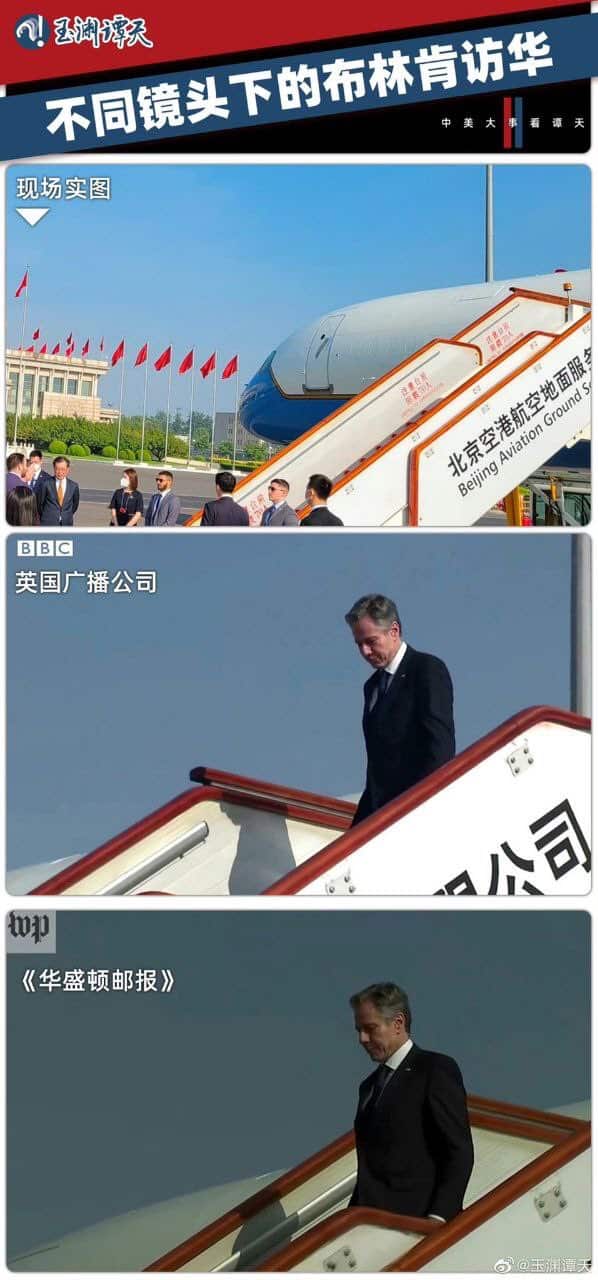
The alleged “smog filter” applied to Beijing skies during Blinken’s visit. Top image: Chinese media. Middle: BBC. Lower: Washington Post.
AFP, meanwhile, seemed to offer a different kind of ‘distortion.’
Netizens said AFP’s photos often had a low-saturation, high-contrast, solemn tone, with wide angles that made the scenes feel oppressive yet majestic. Over time, any photo with that look—whether taken by AFP or not—was dubbed the “AFP filter” (法新社滤镜).
AFP has clarified multiple times that many of the viral examples weren’t even theirs—or that they were, but had been altered with an extra dark filter. They also refuted claims that AFP had published a photo series of Chinese soldiers titled “Dawn of Empire” to discredit China’s army.
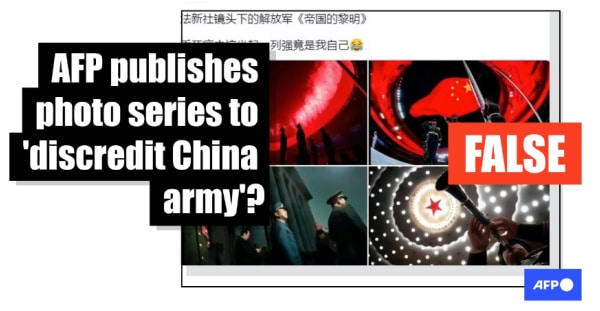
AFP refuted claims that their photos discredited the Chinese army.
Nevertheless, the “AFP filter” label stuck. It became shorthand for a Western gaze that cast China not as impoverished or broken—as some claimed the “BBC filter” did—but as formidable, like a looming supervillain.
One running joke summed it up neatly: domestic shots are the festive version; Western shots are the red-tyrant version. And increasingly, netizens admitted they preferred the latter, commenting that while AFP shots often emphasize red to suggest authoritarianism, they actually like the red and what it stands for.
So, when this year’s V-Day came around, many were eager to see how AFP and other Western outlets would frame China as the dark, dangerous empire.
But when the photos dropped, the reaction was muted. They looked average. Some called them “disappointing.” “Where are the dark angles? Not doing it this time?” one blogger wondered. “Where’s the AFP hotline? I’d like to file a complaint!”
“Xinhua actually beat you this time,” some commented on AFP’s official Weibo account. Others agreed, putting the AFP photos and Xinhua photos side by side.
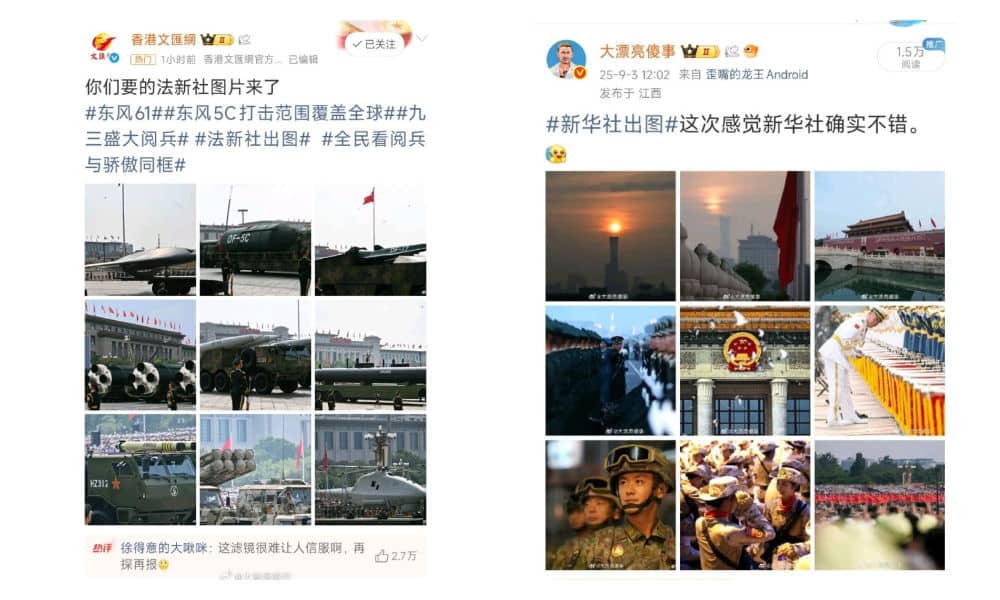
AFP photos on the left versus Xinhua photos on the right.
To make up for the letdown, people began editing the photos themselves—darkening the tones, adding dramatic shadows, and proudly labeling them with the tag “AFP filter” or calling it “The September 3rd Military Parade Through a AFP Lens” (法新社滤镜下的9.3阅兵). “Now that’s the right vibe,” they said: “I fixed it for you!”

Netizen @哔哔机 “AFP-fied” photos of the military parade by AFP.
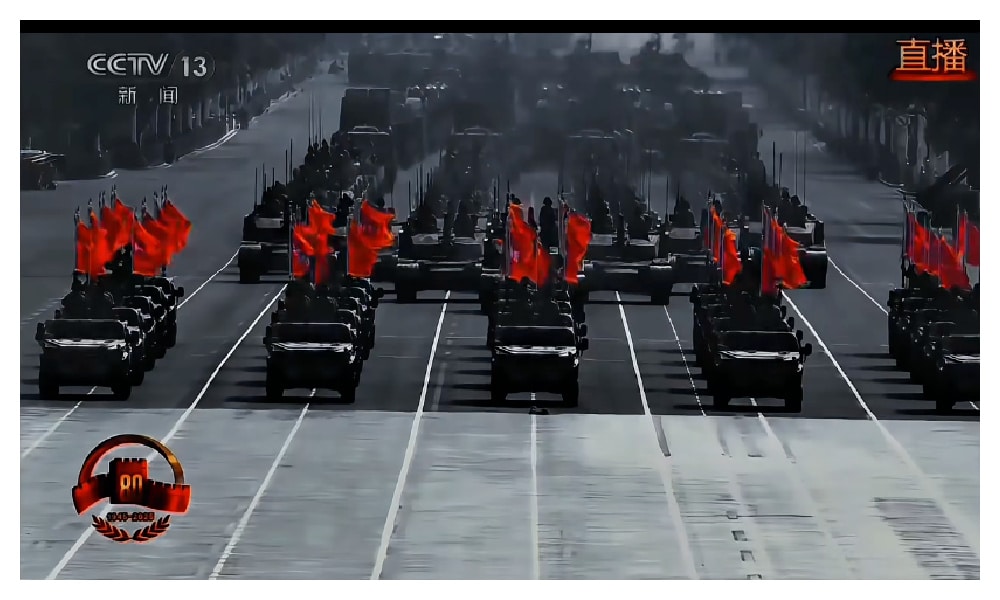
Official media quickly picked up on the trend. Xinhua rolled out its own hashtags—#XinhuaAlwaysDeliversEpicShots (#新华社必出神图的决心#) and #XinhuaWins (#新华社秒了#)—and positioned itself as the true master of a new aesthetic narrative.
The message was clear: China no longer needs the Western gaze to frame itself as powerful or intimidating; it can do that on its own.
The “AFP v Xinhua” contest, the online movement to “AFP-ify” visuals, and the Chinese fandom around AFP’s moodier shots may have been wrapped in jokes and memes, but they also pointed to something deeper: the once “demonized” image of China that Western media pushed as threatening is now not only accepted by Chinese netizens, it’s embraced. Many have made it part of a confident, playful form of online patriotism, applauding the idea of being seen by the West as fearsome, even villainous, believing it amplifies China’s global authority.
As one netizen wrote: “I like it when we look like we crawl straight into their nightmares.”
Chinese journalist Kai Lei (@凯雷) suggested that these kinds of trends showed how the Chinese public plays an increasingly proactive role in shaping China’s global image.
By now, the AFP meme has become so strong that it doesn’t even require AFP anymore. Ultra-dramatic shots are simply called “AFP-level photos” (法新社级别).
For now, as many are enjoying the “afterglow” of the military parade, their appreciation for the AFP-style only seems to grow. As one Weibo user summed it up: “AFP tried to create a sense of oppression with dark, low-angle shots, but instead only strengthened the Chinese military’s aura of majesty.”
– By Ruixin Zhang and Manya Koetse
Spotted a mistake or want to add something? Please let us know in comments below or email us. First-time commenters, please be patient – we will have to manually approve your comment before it appears.
©2025 Whatsonweibo. All rights reserved. Do not reproduce our content without permission – you can contact us at info@whatsonweibo.com.
China Arts & Entertainment
Yearnings, Dreamcore, and the Rise of AI Nostalgia in China
From China’s first soap opera Yearnings to the rise of AI-fueled nostalgia.
Published
3 months agoon
July 2, 2025
The year is 1990, and the streets of Beijing’s Fangshan District are eerily quiet. You can almost hear a pin drop in the petrochemical town, as tens of thousands of workers and their families huddle around their televisions, all tuned to the same channel for something groundbreaking: China’s very first soap opera, Yearnings (渴望 Kěwàng).
Yearnings tells the story of Liu Huifang (刘慧芳), a female factory worker from a traditional working-class family in Beijing, and her unlikely marriage to university graduate Wang Husheng (王沪生), who comes from a family of intellectuals. When Liu finds an abandoned baby girl, she adopts her and raises her as her own, against her husband’s wishes.
The couple is unaware that the foundling is actually the illegitimate child of Wang’s snobbish sister, Yaru. After Liu and Wang have a biological son, the marriage comes under further pressure, eventually leading to divorce. Liu is left as a single mother, raising two children on her own.
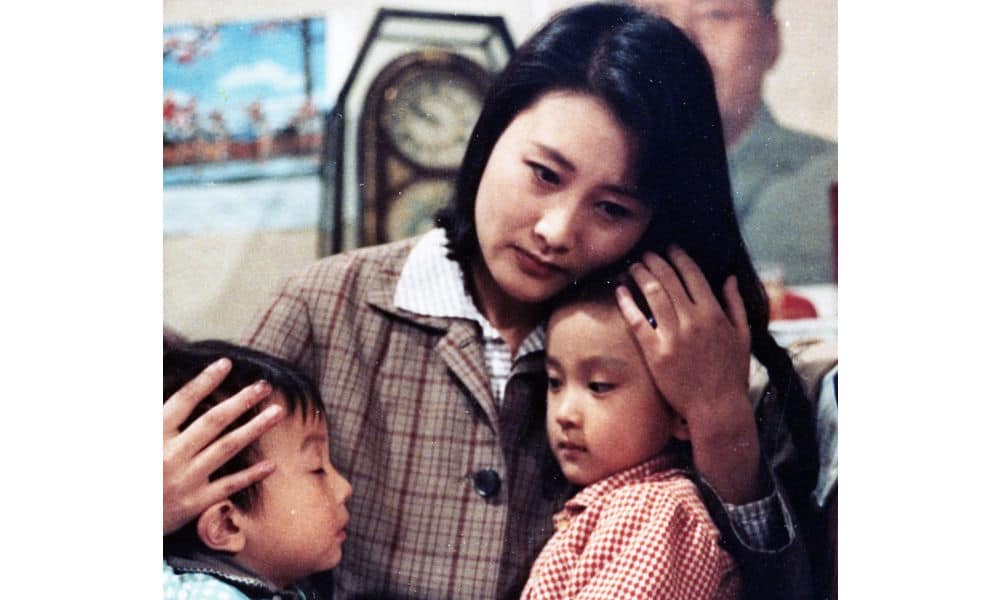
Still from Yearnings, via OurChinaStory.
Drawing inspiration from foreign dubbed television shows, Yearnings was produced as China’s first truly domestic, long-form indoor television drama. Spanning 50 episodes, the series traces a timeline from the onset of the Cultural Revolution in the 1960s through to the late 1980s—one of the most turbulent periods in modern Chinese history.
Before the series aired nationally on CCTV and achieved record viewership, the first station to air Yearnings in the Beijing region was the Yanshan Petrochemical TV Station (燕山石化电视台), China’s first major factory TV station (厂办电视台) located in Fangshan District.
Here, in this town of over 100,000, Yearnings garnered an astonishing and unprecedented 98% audience share. The series was truly groundbreaking and became a national sensation—not just because it was China’s first long-form television drama, or because it was a locally produced drama that challenged the long-standing monopoly of state broadcaster CCTV, but because Yearnings marked a major shift in television storytelling.
Until then, Chinese TV stories had always revolved around communist propaganda, or featured great heroes of the revolution. Yearnings, on the other hand, was devoid of political content and focused on the hopes and dreams of ordinary people and their everyday struggles—love, desire, marital tension, single motherhood—topics that had never before been so openly portrayed on Chinese television.
The show’s creators had perfectly tapped into what was changing: the Communist Party was slowly withdrawing from private life, and people were beginning to see themselves less defined by their work unit and more by their home life—as consumers, as partners and parents, as citizens of a new China filled with aspirations for the future. Yearnings’ storyline was a reflection of that.
Chinese-Style “Nostalgia Core”
Yearnings marked a cultural turning point, coinciding with the rapid spread of TV sets in Chinese households. In 1992, economic reforms triggered a new era in which Chinese media became increasingly commercialized and thriving, before the arrival of the internet, social media, and AI tools once again changed everything.
Today, Yearnings still is a topic that often comes up in Chinese online media. On apps like Douyin, old scenes from Yearnings are reposted and receive thousands of shares.
📌 It’s emblematic of a broader trend in which more netizens are turning to “nostalgia-core.” In Chinese, this trend is known as “中式梦核” (Zhōngshì Mènghé), which literally means “Chinese-style dreamcore.”
Dreamcore is an internet aesthetic and visual style—popular in online communities like Tumblr and Reddit—that blends elements of nostalgia, surrealism, and subconscious imagery. Mixing retro images with fantasy, it evokes a sense of familiarity, yet often feels unsettling and deserted.
The Chinese-style dreamcore (中式梦核), which has become increasingly popular on platforms like Bilibili since 2023-2024, is different from its Western counterpart in how it incorporates distinctly Chinese elements and specifically evokes the childhood experiences of the millennial generation. Content tagged as “Chinese-style dreamcore” on Chinese social media is often also labeled with terms like “nostalgia” (怀旧), “childhood memories” (童年回忆), “when we were little” (小时候), and “Millennial Dream” (千禧梦).
According to the blogging account Yatong Local Life Observer (娅桐本地生活观察), the focus on the millennial childhood can be explained because the formative years of this generation coincided with a decade of rapid social change in China —leaving little in today’s modern cities that still evokes that era.
🌀 Of course, millennials in the West also frequently look back at their childhood and teenage years, particularly the 1980s and 1990s—a trend also embraced by Gen Z, who romanticize these years through media and fashion. In China, however, Gen Z is at the forefront of the “nostalgia-core” trend, reflecting on the 1990s and early 2000s as a distant, almost dreamlike past. This sense of distance is heightened by China’s staggering pace of transformation, modernization, and digitalization over the past decades, which has made even the recent past feel remote and irretrievable.
🌀 Another factor contributing to the trend is that China’s younger generations are caught in a rat race of academic and professional competition, often feeling overwhelmed by the fast pace of life and the weight of societal expectations. In this high-pressure environment—captured by the concept of “involution” (内卷)—young people develop various coping mechanisms, and digital escapism, including nostalgia-core, is one of them. It’s like a cyber-utopia (赛博乌托邦).
🌀 Due to the rise of AI tools available to the general public, Chinese-style nostalgia core has hit the mainstream because it’s now possible for all social media users to create their own nostalgic videos and images—bringing back the 1990s and early 2000s through AI-generated tools, either by making real videos appear more nostalgic or by creating entirely fictional videos or images that recreate scenes from those days.
So what are we seeing? There are images and videos of stickers kids used to love, visuals showing old classrooms, furniture, and children playing outside, accompanied by captions such as “we’re already so far apart from our childhood years” (example).
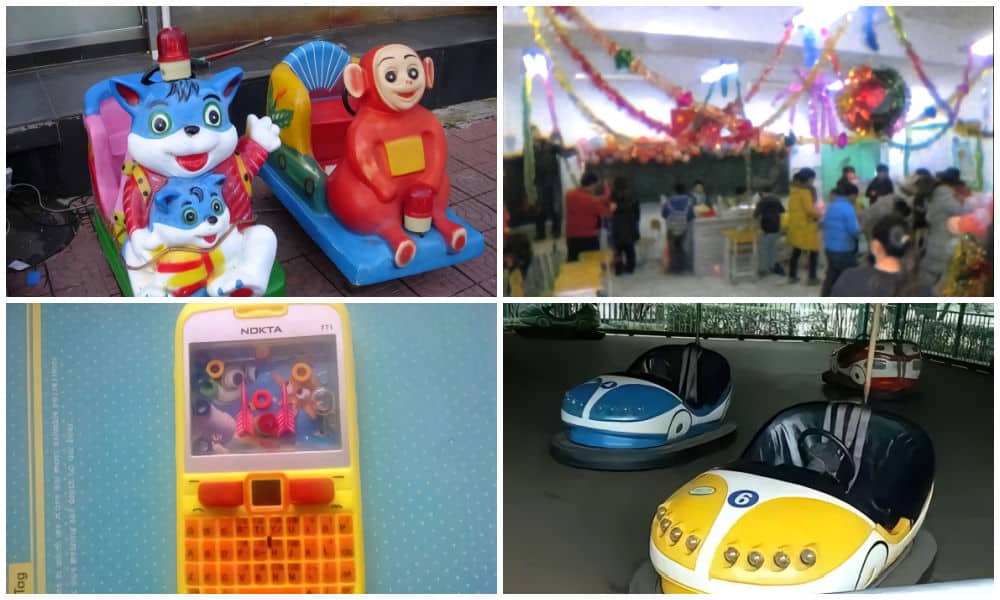
Images displayed in Chinese Dreamcore.
And notably, there are videos and images showing family and friends gathering around those old big TVs as a cultural, ritualized activity (see some examples here).

Stills from ‘nostalgia core’ videos.
These kinds of AI-generated videos depict a pre-mobile-era family life, where families and communities would gather around the TV—both inside and outside—from classrooms to family homes. The wind blows through the windows, neighbors crack sunflower seeds, and children play on the ground. Ironically, it’s AI that is bringing back the memories of a society that was not yet digitalized.
Nowadays, with dozens of short video apps, streaming platforms, and livestream culture fully mainstream in China—and AI algorithms personalizing feeds to the extreme—it sometimes feels like everyone’s on a different channel, quite literally.
In times like these, people long for an era when life seemed less complicated—when, instead of everyone staring at their own screens, families and neighbors gathered around one screen together.
There’s not just irony in the fact that it took AI for netizens to visualize their longing for a bygone era; there’s also a deeper irony in how Yearnings once represented a time when people were looking forward to the future—only to find that the future is now looking back, yearning for the days of Yearnings.
It seems we’re always looking back, reminiscing about the years behind us with a touch of nostalgia. We’re more digitalized than ever, yet somehow less connected. We yearn for a time when everyone was watching the same screen, at the same time, together, just like in 1990. Perhaps it’s time for another Yearnings.
By Manya Koetse
(follow on X, LinkedIn, or Instagram)
Sources (other sources included in hyperlinks)
Koetse, Manya. 2016. “From Woman Warrior to Good Wife – Confucian Influences on the Portrayal of Women in China’s Television Drama.” In Stefania Travagnin (ed), Religion and Media in China. New York: Routledge.
Rofel, Lisa B. 1994. Yearnings: Televisual Love and Melodramatic Politics in Contemporary China. American Ethnologist 21(4):700-722.
Wang, Dan (汪丹). 2018. “《渴望》的艺术价值” [The Artistic Value of Yearnings].” Originally published in Beijing Daily (北京日报), October 12, 2018. Reprinted in Digest News (文摘报), October 20, 06 edition. Also see Sohu: 当年红遍大江南北的《渴望》.
Wang Min and Arvind Singhal. 1992. “Kewang, a Chinese television soap opera with a message.” Gazette 49: 177-192.
Zhuge Kanwu. 2021. “重温1990《渴望》:苦得“刘慧芳”希望被导演写“死” [Revisiting 1990’s Yearnings: The Suffering Liu Huifang Hoped to Be Written Off by the Director]. Zhuge Dushu Wu (诸葛读书屋), January 22. https://wapbaike.baidu.com/tashuo/browse/content?id=b699ee532cf79f862bfa14ad.
Spotted a mistake or want to add something? Please let us know in comments below or email us. First-time commenters, please be patient – we will have to manually approve your comment before it appears.
©2025 Whatsonweibo. All rights reserved. Do not reproduce our content without permission – you can contact us at info@whatsonweibo.com.
Subscribe
What’s on Weibo is a reader-supported publication, run by Manya Koetse (@manyapan), offering independent analysis of social trends in China for over a decade. To receive new posts and support our work, consider becoming a paid subscriber.

Get in touch
Would you like to become a contributor, or do you have any tips or suggestions? Get in touch here!

How the “Nexperia Incident” Became a Mirror of China–Europe Tensions

China Faces Unprecedented Donkey Shortage Crisis

Nanchang Crowd Confuses Fan for Knife — Man Kicked Down and Taken Away

The Wong Kar-wai Scandal Explained: The Dark Side of ‘Blossoms Shanghai’

China’s National Day Holiday Hit: Jingdezhen’s “Chicken Chop Bro”

Hidden Cameras and Taboo Topics: The Many Layers of the “Nanjing Sister Hong” Scandal

“Jiangyou Bullying Incident”: From Online Outrage to Offline Protest

The Rising Online Movement for Smoke-Free Public Spaces in China

China Trend Watch: Pagoda Fruit Backlash, Tiananmen Parade Drill & Alipay Outage (Aug 11–12)

From Schadenfreude to Sympathy: Chinese Online Reactions to Charlie Kirk Shooting
Popular Reads
-

 China Memes & Viral3 months ago
China Memes & Viral3 months agoHidden Cameras and Taboo Topics: The Many Layers of the “Nanjing Sister Hong” Scandal
-

 China Books & Literature11 months ago
China Books & Literature11 months agoThe Price of Writing Smut: Inside China’s Crackdown on Erotic Fiction
-

 China Insight5 months ago
China Insight5 months agoUnderstanding the Dr. Xiao Medical Scandal
-

 China Memes & Viral10 months ago
China Memes & Viral10 months agoOur Picks: Top 10 Chinese Buzzwords and Phrases of 2024 Explained


